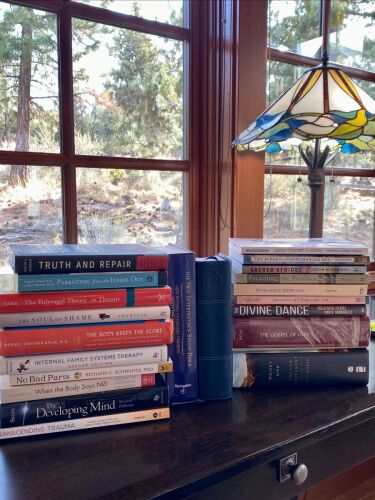 This week, I met with a fellow writer who offered tips for introducing more people to my book. Whenever I have conversations about promoting my work, part of me cringes, and another part of me feels like she wants to run away from the topic. These protective members of my inner family wish people would magically find and benefit from the book—end of story. Imagine their reaction to hearing that one of the best ways for people to discover my book was by having more book reviews. Amazon’s algorithm is kind to authors whose readers give reviews.
This week, I met with a fellow writer who offered tips for introducing more people to my book. Whenever I have conversations about promoting my work, part of me cringes, and another part of me feels like she wants to run away from the topic. These protective members of my inner family wish people would magically find and benefit from the book—end of story. Imagine their reaction to hearing that one of the best ways for people to discover my book was by having more book reviews. Amazon’s algorithm is kind to authors whose readers give reviews.
But that requires expressing a need by inviting readers to share a review after they read the book. I must say, “Can you do me a favor? I need a few minutes of your time to share a bit about how my book helped you.”
What happens inside you when you imagine expressing a need?
Maybe my need seems trivial in the context of your need for your partner to notice you—to act in ways that say, “I see you, and I love you.”
Or, you have been shouldering far too much of the load and need support. But every time you’ve asked, the answer is defensive and dismissive.
Perhaps you need to share a dream. You feel a nudge to take a risk, start something new, or walk away from something that no longer serves you.
Identifying our needs is a crucial part of healing.
Too often, we learn to disconnect from them to adapt to environments that tell us they aren’t valid or important. Connecting with parts of you who protect you by denying needs opens space for awareness of unmet longings.
When it’s time to say those needs out loud, parts of us will jump in to alert us to risk. Because as soon as we express a need, we allow the possibility of it being invalidated or ignored.
And when our needs are invalidated or ignored, an arrow strikes the heart of our deepest fear—that we are unworthy, stupid, or unlovable.
It might seem dramatic to think that expressing a need can trigger a deep wound. And I am not suggesting that’s always the case. But more often than we might be aware, protective members of our internal family ensure we stay silent or minimize needs because they are convinced it’s too risky to share them.
Have you been minimizing your needs—avoiding awareness of them or avoiding expressing them?
Loving ourselves includes valuing needs across the spectrum, from a little free time to decompress to an open-hearted connection with loved ones who see us and accept us exactly how we are.
If you sense that protectors are blocking needs—because you feel irritable and resentful toward people who rely on you, you are tired and overwhelmed, or you are bored and afraid to make changes—turn toward them. Have a chat. Find out why they are keeping you disconnected from learning about longings.
Protectors steer us away from vulnerability.
That’s their job, and they are dedicated to it. Yet, they are tired and would rather do something more fun than squelching your dreams. Let them know they can count on you for clarity to discern needs and confidence to express them.
It can help to start with something important but not vital. Protectors won’t be as rigid because there’s not as much at stake.
Here’s me practicing:
If you read and appreciated my book, Restoring Relationship: Transforming Fear into Love Through Connection, I invite you to leave a review. One sentence (or more!) and four or five stars help others find this resource. As I share the book’s message, particularly insight about why Christians talk so much about love but often fail to be loving, I’m touched by how it resonates and supports healing. My desire is for it to help people heal, particularly from wounds inflicted by their spiritual community.
Here’s the link to make it easy! https://www.amazon.com/review/create-review/?ie=UTF8&channel=glance-detail&asin=B08KH3VDPG




Leave A Comment